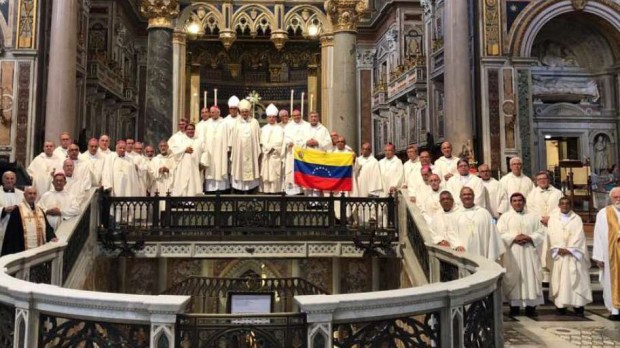As a result of the despotic misadministration of the Nicolás Maduro government, Venezuelans are facing the tragedy of “forced displacement” by which over two and a half million people have been forced to leave Venezuela looking for a better way of life. They are “finding, simultaneously, both support and rejection” in Brazil, Colombia, Ecuador, Peru, and Argentina, among other countries in Latin America and the world.
This is one of the topics that the Venezuelan Episcopal Conference (CEV) has been sharing with Pope Francis in the Vatican during their Ad Limina Apostolorum visit this September 6 to 15.
The 41 members of the Venezuelan episcopacy, including 17 new prelates who have been appointed in recent years, are in Rome for these visits, held every few years. Venezuela has nine archdioceses, 26 dioceses, three apostolic vicariates, two eparchies, and one military ordinariate.
“We are going to present to Pope Francis a report of the pastoral work that has been carried out in each of the dioceses of Venezuela, along with the hopes and dreams of the people of God,” said one of the bishops who spoke with Aleteia prior to the audience with the Holy Father. “We will inform him of the humanitarian crisis that shows no promise of change, especially after the economic restructuring imposed by the government.”
“We will talk about social policies which daily are becoming more limiting and dependent on a ‘Carnet de la Patria” – an ID card that was created to segregate those who do not acquiesce to the ruling party. “Of course, we will also discuss the political issues which are still very worrisome because of the imprisonment and confinement of more than 350 prisoners of conscience, along with threats made to leaders who are forced into exile, and the illegalization of opposing political parties.”
“In short, the bishops will be the voice of the poorest and the most defenseless in our Venezuelan society,a beacon of light in defense of the life and the commitment of all,” said the source, citing Bishops Mario Moronta Rodríguez and José Trinidad Fernández, first Vice-President and Secretary General of the CEV, respectively, during the presentation of the Pastoral Letter on the occasion of the Ad Limina Apostolorum visit.
Communion with the Holy Father
For his part, Tulio Luis Ramírez Padilla, Auxiliary Bishop of Caracas, in an exclusive conversation for Aleteia, stressed that the central purpose of the Ad Limina visit, as always, is to make a pilgrimage to the tombs of the pillars of the Church and there to pay homage to the Holy Apostles Peter and Paul; to present to the pope the “quinquennial report” of each diocese; and to meet “on this occasion, not individually, but in groups of seven or more bishops.”
Therefore, their visit will be an opportunity to express the communion between the bishops of Venezuela and the Holy Father, and a means to reaffirm that communion. “The voyage to Rome is not for tourism, much less as administrative functionaries,” reiterated the prelate who oversees media relations for the CEV.
“The Venezuelan bishops are more like pilgrims who wish to confirm our closeness and adherence to the Bishop of Rome, the visible head of the Church. Likewise, we would like to thank Pope Francis for remaining very attentive to the affairs of Venezuela and for continually joining himself to our pain and suffering.”
That is why, the bishop told Aleteia, “this visit wishes to be an answer to the prayer and supplications of our people” – a meeting for which “we have further been preparing with two days of spiritual retreat and reflection: the first on August 15, before the trip to Rome, and the second on September 8 during the visit.”
A pope close to Venezuela
Auxiliary Bishop Tulio Luis Ramírez Padilla expressed his rejection of the propaganda spearheaded by some sectors within the Venezuelan government that are wanting to distance Pope Francis from the events that are taking place in Venezuela, and trying to create antagonistic public opinion among the Venezuelan people about the figure and views of the pontiff. “I must say that Pope Francis is very close to us bishops, especially in the face of the difficult situation through which our country is going, one of the greatest crises in the history of our Republic,” stressed the Caracas prelate.
The vitality of the Church
“In the quinquennial report, there are details of the immense efforts in the field of evangelization and catechesis made by our priests, deacons, seminarians, and committed lay people. It includes statistics regarding the sacramental life of Catholics in Venezuela, the great evangelizing and missionary work, statistics related to the religious congregations present in the various particular churches or dioceses. It also addresses the hopes of the local Church in regards to our seminaries and houses of formation.”
But also “the bishops will express the anxieties, worries, and anguish before the serious problems that our people must face, and we with them,”he said, adding that the forced emigration of many of the laity “who are active in the Church’s mission (…) is causing a decline in our educational outreach and in the formation of new generations.”
He stressed that the Bishop of Rome “has a special interest in supporting us and trying to lend a helping hand by expressing his social commitment to the poorest and most vulnerable people in Venezuela.” Therefore, the Venezuelan episcopate believes that as a result, this great visit with the pope will provide “a renewed evangelizing, catechetical impulse to the Church of Venezuela, and that we are called to continue to be the messengers of that peace, hope, and authentic freedom that must continue to be proclaimed to the people.”
The last Ad Limina visit by the leaders of the Church in Venezuela took place from June 1-18, 2009, when they were received by Pope Benedict XVI. Previously, in 2002 they were received by Pope St. John Paul II.

